|

|
| British Transport Films |
| NEWS UPDATE |
 We have launched a new web-blog that We have launched a new web-blog that
details all the additions to this website.
Please keep checking back regularly or
subscribe to the RSS or email feeds to
ensure you don't miss anything as new
content is being added to regularly!

|
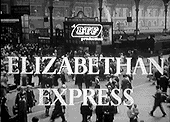 Welcome to the website dedicated to the well loved 'British Transport Films' (BTF) production unit. Here you will be able to look at details of many of the film unit's productions, read film reviews and view several images from the extensive BTF stills collection.
Welcome to the website dedicated to the well loved 'British Transport Films' (BTF) production unit. Here you will be able to look at details of many of the film unit's productions, read film reviews and view several images from the extensive BTF stills collection.
Many of BTF's classic works such as 'Elizabethan Express', 'Train Time', 'Snowdrift at Bleath Gill' and 'Blue Pullman' are well known amongst railway enthusiasts, but virtually no information is available as to the contents of a great number of their other films that were produced over five decades. Indeed, without access to John Reed's 'Moving Images', even a list of productions is impossible to find.
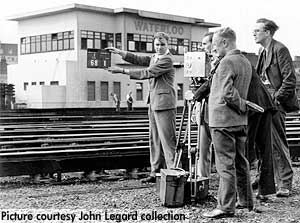 British Transport Films was formed in May 1949 with Edgar Anstey as its first Producer in Charge. Anstey was a protégé of John Grierson the principle documentary film maker in the 1930s and the founder of the British Documentary Movement.The nationalisation of Britain's four major privately owned railway companies, along with other transport undertakings including road motor transport and canals, took place in 1948. Two of the major railway companies maintained film units which were amalgamated into the new BTF, and carried on the work of the previously privately run units. Their purpose was the making of travelogue films that promoted destinations in town, country and seaside resorts throughout the British Isles, and promoted rail or associated transport as the best means for people to travel to the destinations represented on screen. Another successful vein was the production of films that represented the nationalised transport workforce and the part they had to play in rebuilding the country. Of more direct concern to staff were the films made to explain complicated operational aspects of the transport undertakings and, were used in training schools.
British Transport Films was formed in May 1949 with Edgar Anstey as its first Producer in Charge. Anstey was a protégé of John Grierson the principle documentary film maker in the 1930s and the founder of the British Documentary Movement.The nationalisation of Britain's four major privately owned railway companies, along with other transport undertakings including road motor transport and canals, took place in 1948. Two of the major railway companies maintained film units which were amalgamated into the new BTF, and carried on the work of the previously privately run units. Their purpose was the making of travelogue films that promoted destinations in town, country and seaside resorts throughout the British Isles, and promoted rail or associated transport as the best means for people to travel to the destinations represented on screen. Another successful vein was the production of films that represented the nationalised transport workforce and the part they had to play in rebuilding the country. Of more direct concern to staff were the films made to explain complicated operational aspects of the transport undertakings and, were used in training schools.
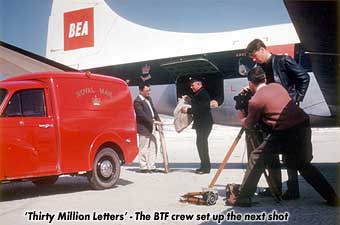 The unit's production arm functioned from 1949 until 1982. The most memorable period of the unit was from 1949 until the mid 1960s. The argument could be made that the unit's fortunes mirror that of the decline in short cinema documentary films and the cinema newsreel. Another avenue of exhibition that still existed in the late 70s was the private showing of films to local societies. This service provided a projectionist who brought with him from London, not only the programme of films, but all the resources required for the screening. This service illustrates the publicity value of the BTF archive that was still exploitable.
The unit's production arm functioned from 1949 until 1982. The most memorable period of the unit was from 1949 until the mid 1960s. The argument could be made that the unit's fortunes mirror that of the decline in short cinema documentary films and the cinema newsreel. Another avenue of exhibition that still existed in the late 70s was the private showing of films to local societies. This service provided a projectionist who brought with him from London, not only the programme of films, but all the resources required for the screening. This service illustrates the publicity value of the BTF archive that was still exploitable.
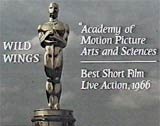 Whilst BTF did a great service to the film industry in providing a comprehensive training facility for aspiring filmmaking talent, the unit had a commercial remit to fulfil from the British Transport Commission and later the British Railways Board. The main purpose of the unit was to provide films that would stimulate travel by the commission's diverse services, and also to inform the public of the effort that went into providing these services. Between 1955 and the penultimate year before the full units dispersal in 1982, BTF had won 185 awards including the Hollywood 'Oscar’ for ‘Wild Wings’ directed by John Taylor in 1966, for Best Live Action Short Subject.
Whilst BTF did a great service to the film industry in providing a comprehensive training facility for aspiring filmmaking talent, the unit had a commercial remit to fulfil from the British Transport Commission and later the British Railways Board. The main purpose of the unit was to provide films that would stimulate travel by the commission's diverse services, and also to inform the public of the effort that went into providing these services. Between 1955 and the penultimate year before the full units dispersal in 1982, BTF had won 185 awards including the Hollywood 'Oscar’ for ‘Wild Wings’ directed by John Taylor in 1966, for Best Live Action Short Subject.
In the general output of BTF the view is taken of Britain slowly coming out of the ravages of war into the 1950’s this is an important legacy that Anstey and BTF has left for future generations. Furthermore BTF went onto to reflect the ‘swinging sixties’ and then change again to reflect the mood of the seventies. Although BTF was a sponsored unit, Anstey and his team of resident and freelance filmmakers have managed not only to capture the transport of the time but moreover the period it operated in. As BTF was indirectly publicly funded through subsidies to the B.T.C. and B.R.B. from 1954, the unit has provided another service to the public in recording three diverse and interesting decades of British way of life and transport.
(text courtesy Paul Smith, Paddington Films)
Visitors are invited to explore this website and discover the fantastic legacy of BTF which even now is still not as widely recognised as its grand efforts deserve, even though it was responsible for capturing the general transport scene at a time of great transition - a priceless legacy of moving and still images that deserves more exposure than it gets today.
You may now follow us on Facebook and Twitter!
For further details about the BTF website, please email the webmaster : (info at britishtransportfilms co uk)
text and Images contained on this website are copyight and may not be used without prior permission.
A BTF advert from the March 1963 edition of 'Modern Railways' magazine.
Now all 'they' have to do is buy one of the many superb DVD compilations available Check the DVD page for details.
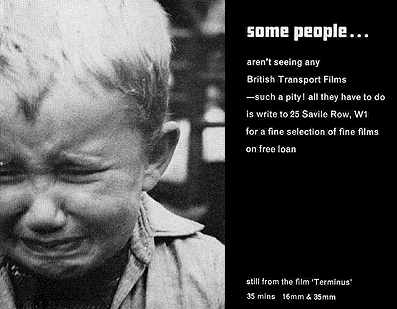 |
 We have launched a new web-blog that
We have launched a new web-blog that




